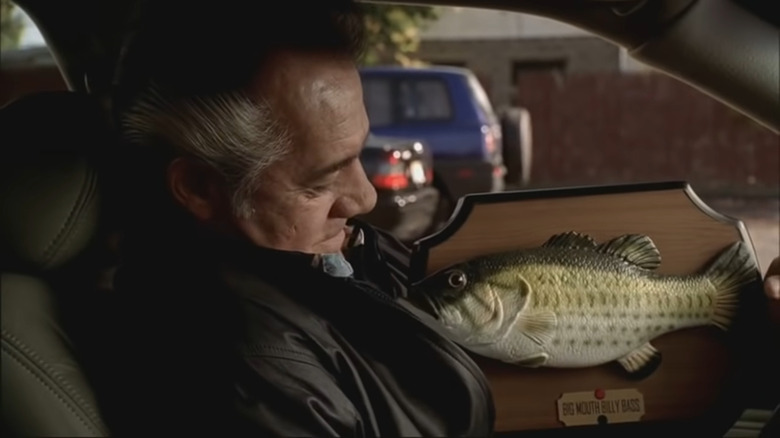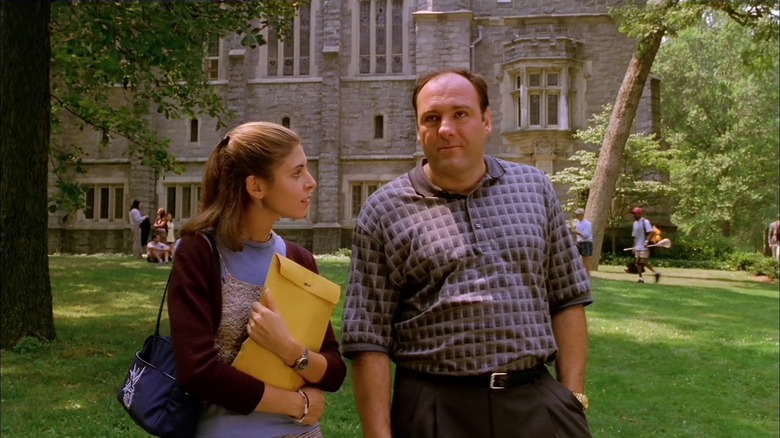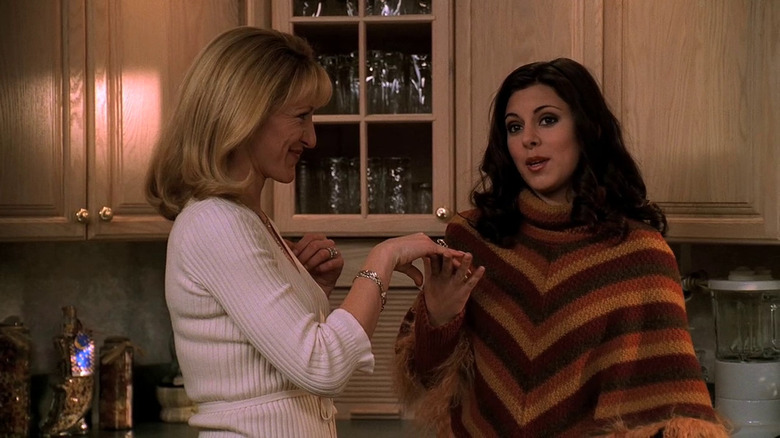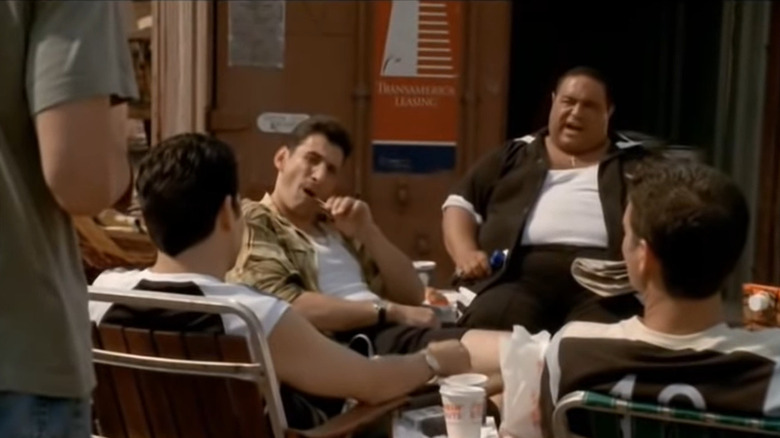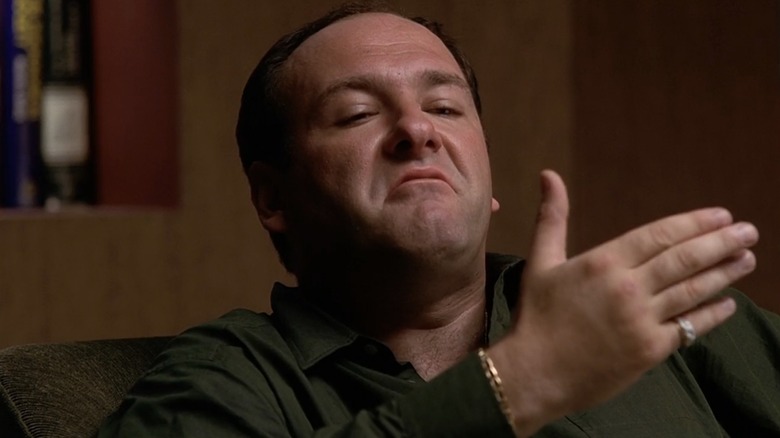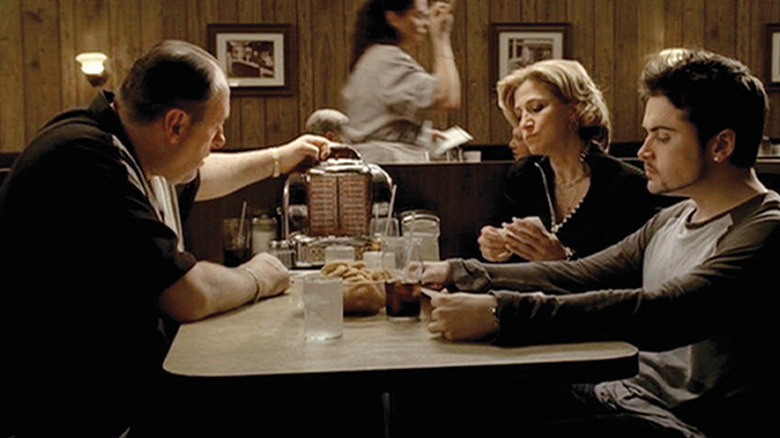How The Sopranos Wove Pop Culture Into The Core Of The Show
One of the more interesting aspects of "The Sopranos" is how closely tied it is to the time in which it was made. Those singing fish props were a huge hit back in the late '90s, and sure enough, they ended up playing a recurring part in season 3. When Bill Clinton was president, the characters would talk about the Clintons, and when George W. Bush was president they'd talk about Bush. The characters' clothing, their hairstyles, the music they listened to — it all evolved as the show journeyed from 1999 to 2007. The world changed a lot in that time period, and that's reflected in how different the later seasons feel compared to the early ones.
A lot of shows try to avoid pop culture references in an attempt to avoid feeling outdated years down the line, but "The Sopranos" had the complete opposite strategy, and it might be a key part of why it's still so popular 15 years after it ended. Because the show was so interested in commenting on the contemporary world, watching it today hits a similar feeling to watching "Mad Men," where you're getting a nice little glimpse into a world gone by. The show not trying to be timeless made it end up feeling more timeless than nearly any of its contemporaries.
How the writers went about it
When asked if there was some sort of formula in mind for the pop culture references included in the show, staff writer Terrence Winter explained, "It was just what felt real. You don't have to be a mob guy even to just continually reference the world around us in pop culture, TV shows. It's just part of the fabric of daily conversation, and is for those guys too." He mentioned an article he'd read about an FBI wiretap of a real-life mob family, and mob family had "The Godfather" playing in the background. Winter continued:
"During an actual mob meeting! And you're like God, they really see this as their own soundtrack."
It also helped that Winter was the same age as Tony (James Gandolfini) was supposed to be:
"So growing up in the same years I did, he would reference the same stuff I watched on TV. So there's a lot of Honeymooners references. Somebody said, 'well, there's only going to be two people out there who are going to get this joke.' David said, 'yeah those are the two people we're writing for.'"
Things were a little harder when it came to writing the younger characters like Meadow (Jamie-Lynn Sigler) and AJ (Robert Iler), who were in a whole different age group from the writers. But they leaned into the generation gap, throwing in constant moments where the kids didn't understand what Tony or Carmela (Edie Falco) are talking about, or where the adults can't manage the same level of enthusiasm the kids felt about their favorite shows and movies. At one point in season 3, AJ gets Carmela a DVD of "The Matrix," a movie she clearly has no interest in. (A few moments later, AJ's shown taking it for himself and leaving the room.)
Exploring character through changing culture
Perhaps the clearest example of the show using pop culture to highlight the core differences in the characters is in the season 4 episode "Eloise," where Carmela starts an argument with Meadow over the old Herman Melville novel, "Billy Budd, Sailor." It's a book that was commonly taught in high school and college, although a lot less often today than in 2002. It's also a book with gay themes, themes which were largely ignored in most high school teachings but were increasingly addressed by college academics in the late twentieth century.
As a result, it creates a sudden clash at the dinner table when Meadow and all her college friends mention the book's queer subtext, which frustrates and bewilders Carmela, who always interpreted the story under the more conservative, old-school lens of a "story about an innocent sailor being picked on by an evil boss." When Meadow pushes back, Carmela goes on a whole rant about "this gay nonsense" being taught in schools. "This stuff is pervading our educational system," she says, "Not to mention movies, TV shows..."
It's a sentiment that still feels familiar today. It's easy to bash Carmela for being homophobic, but she's not actually upset over the book being gay; through the whole episode, she feels like her life is empty, and now she's seeing her daughter getting an education and building a life for herself in a way that she never did. When Meadow and her teenage friends start talking about an interpretation of "Billy Budd" that exposes her own view of the book as outdated and less-informed, it's more salt in that wound.
The focus is (almost) always the characters
The "Billy Budd" dinner argument scene is so interesting because it seems to center around a few particularly controversial topics at the time, but it's not actually about any of those things. It's about showing Carmela's emotional state after Furio (Federico Castelluccio) returns to Italy, and her complicated feelings towards her daughter.
It's a less clunky version of the infamous Christopher Columbus episode, where the characters' varying opinions on Columbus Day serves to show the generational gap — AJ and Christopher (Michael Imperioli) are the most willing to question Columbus's status as a clear-cut hero — as well as to highlight the small-mindedness and hypocrisy of most of Tony's crew. At one point, Bobby (Steve Schirripa) calls the Native Americans lazy, saying "What the f*** we ever get we didn't have to work for? I wouldn't mind sitting all day smoking mushrooms and collecting government checks." But as those who remember the many scenes where the characters work their "construction jobs," sitting around doing nothing all day is most of what these mafia guys do.
The characters are constantly talking politics or other controversial issues, but it rarely feels preachy because none of these characters — with the possible exception of Dr. Melfi — ever feel like they're supposed to be the voice of reason. What the characters have to say about any given political issue is meant simply as a window into their psyche, not as the show itself taking a stance. The only period where that does seem to be the case is season 1, which the show quickly outgrows.
The central joke
In an interview after season 1, showrunner David Chase described the central idea originally behind "The Sopranos":
"The essential joke was life in America had gotten so savage, selfish — basically selfish — that even a mob guy couldn't take it anymore. And he's in therapy. He and his guys were the ones who invented selfishness. They invented 'Me First.' And now he can't take it anymore because the rest of the country has surpassed them.
This attitude is the most clear in season 1, which features the Soprano family at their most likeable, where the show was most willing to portray its non-Mafia characters as more annoying and insufferable than the actual mob guys. Sure, Tony strangles a guy to death in the fifth episode, but when he's going off on AJ's teachers for being too quick to recommend medication to solve AJ's behavioral problems, it certainly feels like we're meant to agree with what he's saying, like the writers are using him to say their piece on the popular debate around the issue. "That's the trouble with you people," Tony says. "Every time you see a problem, you turn it into a disease."
Likewise, when Carmela goes off on Father Phil (Michael Santoro) for being a weird creep, she's pretty clearly in the right here. "I think you have this M.O. where you manipulate spiritually thirsty women, and I think a lot of it is tied up with food somehow ... as well as the sexual tension game," Carmela tells him. And yeah, she pretty much nailed it: Father Phil's the worst. But these moments where the main characters get to tell characters off — where the show gives them some semblance of moral authority over people outside the mafia– become increasingly few and far between as the show goes on.
Making things clear
David Chase was famously annoyed by the way the fans cheered on the mafia characters, taking the show's critique of American culture as a whole as some sort of defense of Tony. "Tony's this lovable guy, yet he's still a complete sociopath," Chase said, and the show makes that increasingly clear as it goes along. If the first season was all about the irony of the world being so messed up that a mob boss was often the most sympathetic person in the room, the rest of the show felt like the show saying, "but just to be clear, this mob boss is still terrible."
Perhaps that's why the final song of the series is Journey's "Don't Stop Believing." At first glance it sounds like a hopeful tune, maybe something to cling to if you want to believe Tony didn't die during that final cut to black. But behind the scenes, there was another reason behind the choice: the cast and crew really didn't like it. Chase described their reaction when he first raised the idea of using it as the final song in the show: "They went, 'Oh, Jesus Christ, no. Don't do that! Ugh. F***.' And I said, 'Well, that's it. That's the one.'" It paints a much more cynical picture of the diner scene, making it feel like it was intended less as a sentimental goodbye and more as a good riddance.
As fellow /Film writer Danielle Ryan put it, "the song is about surviving against the odds, and the odds are not in Tony's favor. When the scene cuts to black and ends immediately after the word 'stop,' it's a harsh goodbye." Tony likely didn't live long after that cut to black, and the show seems to argue this might be for the best.
